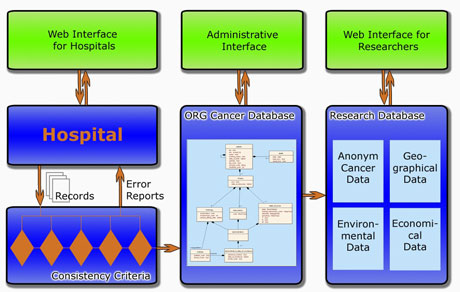by László Kovács and Máté Pataki
The aim of the National Cancer Registry GRID project (Országos Rákregiszter GRID - ORG) is to develop the next generation of the National Cancer Registry (NCR) for Hungary. The NCR started operation in 1999, and its central mission is the collection, management, and analysis of medical data on people who have been diagnosed with malignant or neoplastic disease (cancer). The technology behind NCR is now outdated, and our goal is to create a modern distributed system with a user-friendly Web-based interface and secure data transfer.
The ORG project is a consortium of the Department of Distributed Systems (DSD) of SZTAKI, Arvato Systems Hungary Inc. and the National Institute of Oncology. It has been responsible for building new online infrastructure to collect and validate medical data, which will greatly improve the quality of data on cancer diseases in the NCR and thus provide a much stronger statistical base for decision-makers and medical researchers.
One of the other important objectives of the ORG project is to broaden the range of data associated with cancer diseases. The current NCR collects only cancer-specific medical data and provides annual reports and statistics focused on the geographic spread of cancer cases. In the ORG system we plan to collect other healthcare, environmental, political, demographical and economical data associated with a given geographical territory (grid cell). Associating these data with the currently collected cancer-specific records will give a much more comprehensive view of possible causes of cancer, and aid experts in the analysis of factors affecting the progress of cancer diseases.
The quality of the collected data is an essential factor, not only for researchers but also for physicians. For instance, the latter could use the system to identify similar cancer cases, and thus for decision support. To achieve reliability in the collected data we introduced so-called consistency criteria. These are like small plug-ins, with each analysing incoming records for different types of errors, such as invalid address, name and sex mismatch, miscoding of disease code (BNO) etc. During the lifetime of the system new requirements could emerge or frequent errors in the incoming data be discovered. By writing consistency criteria and adding them to the system, further occurrences of these errors can be easily detected and avoided. These criteria will then warn the operators if an error is found or suspected. The operator or the physician can then decide if it is indeed an error, or merely an unusual case.
To make this system more accessible a Web-based interface is used, allowing the new registry to be accessed easily from any browser without having to install third-party software. Because data collected by the registry is sensitive and confidential, privacy and security are important issues. Access is therefore limited to the internal network of the hospitals, and even there the system uses a secure transfer protocol. Each hospital can install client software, which will automatically import the necessary data from their internal system (warning immediately if errors are found by either the local consistency criteria or the central server). Within this distributed system, these clients communicate with the server also by secure connections. This in itself is a huge step forward, since up until now, data was often sent on a floppy disk by regular post.

The ORG Cancer Registry is currently in a test phase, which will finish in early 2007. After this, the old and the new systems will run in parallel in order to eliminate any remaining errors in the system, train personnel, and prepare for the final switch from the old system to the new one.
Link:
ORG Project Page: http://dsd.sztaki.hu/projects/org/en/
Please contact:
László Kovács
SZTAKI, Hungary
Tel: +36 1 279 6212
E-mail: laszlo.kovacs![]() sztaki.hu
sztaki.hu










